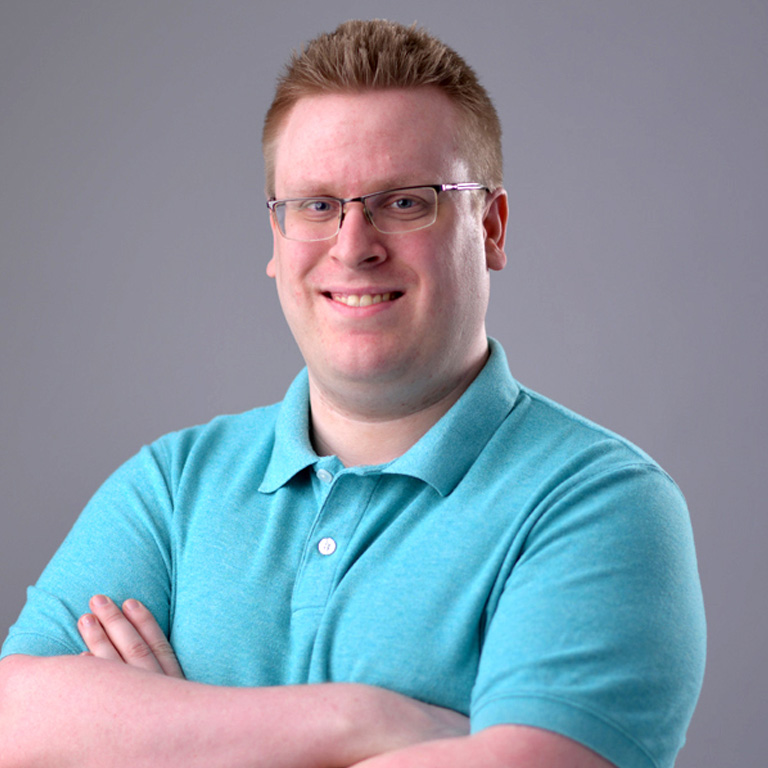Meet the Team
Brandon RichardWebster, Ph.D.
Senior R&D Engineer
Kitware Minneapolis
Minneapolis, MN
Ph.D. in Computer Science & Engineering
University of Notre Dame
M.S. in Computer Science & Engineering
University of Notre Dame
B.S. in Computer Science
Bethel University
Brandon RichardWebster is a senior R&D engineer who works remotely on Kitware’s Computer Vision (CV) Team. He works closely with the CV team on their ongoing projects, including those funded by the Defense Advanced Research Projects Agency (DARPA).
While pursuing his Ph.D., Brandon has worked on numerous substantial, large-scale university contracts under DARPA, Intelligence Advanced Research Projects Activity (IARPA), and the Federal Bureau of Investigation (FBI). His primary role in these projects was to act as a psychologist for artificial intelligence. He helped develop some of the earliest protocols in computer vision to enhance algorithms with human perceptual behavior.
In addition to his primary research, Brandon also spent 10 months in Australia as a Fulbright Scholar, where he collected data with biologists and roboticists. The team was tasked with fighting an invasive species that was destroying the ecosystem for cattle in Australia and the U.S. Brandon helped lay the groundwork for automated recognition software that could be deployed by farmers by drone.
Before going to Australia, Brandon interned with Scott McCloskey, assistant director of computer vision at Kitware, and worked alongside Michael Albright, senior R&D engineer at Kitware. They focused on image forensics and researched ways to detect image modifications and forgeries using Focus Pixels, a hardware-level artifact in iPhone images. This experience allowed him to experience image forensics and acquisition at a granular level.
Brandon also helped launch a new startup company. One of his primary roles was to migrate and develop computer vision algorithms for a field-programmable gate array (FPGA). He also conceptualized and developed an early prototype of a hardware-software combination that could detect hairline defects in medical-grade bottles. His concept won a contract bid from a Fortune-500 company.
Brandon received both his Ph.D. and master’s degree in computer science and engineering from the University of Notre Dame. He received his bachelor’s degree in computer science from Bethel University, minoring in mathematics, biblical and theological studies, and management in information systems.
Awards
Fulbright Futures Scholar to Australia, Institute of International Education, 2020
13th Annual SRS-CSE Poster Contest Winner, University of Notre Dame, Department of Computer Science & Engineering, 2019
Graduate Research Fellowship Program, National Science Foundation, 2016
Invited Talks & Media
“Drones and forgiveness,” radio broadcast, Conversations, Australia Broadcasting Company, 2020
“Visual Psychophysics for Machine Learning,” invited talk, IEEE 27th International Electrotechnical and Computer Science Conference (ERK), 2018
“Deep Learning / AI,” invited talk, Bethel University, 2017
“Anomaly Detection,” invited talk, Bethel University, 2017
“Towards an Artificial Brain,” invited talk, Bethel University, 2017
“Angulary.js Web Development,” undergraduate talk, Bethel University, 2015
“Scratching where it Itches: Tracking a single neuron in noise,” spotlight talk, Bethel University, 2014
“Multiple Hypothesis Tracking in Microneurography,” spotlight talk, Bethel University, 2014
Professional Associations & Service
Student member, Computer Vision Foundation, 2016-2021
Student member, IEEE, 2015-2020
Publications
- B. Hu, B. RichardWebster, P. Tunison, E. Veenhuis, B. Ravichandran, A. Lynch, S. Crowell, A. Genova, V. Bolea, S. Jourdain, and A. Whitesell, "NRTK: an open source natural robustness toolkit for the evaluation of computer vision models," in Assurance and Security for AI-enabled Systems, 2024. [URL]
- B. Hu, B. RichardWebster, P. Tunison, E. Veenhuis, B. Ravichandran, A. Lynch, S. Crowell, A. Genova, V. Bolea, S. Jourdain, and A. Whitesell, "NRTK: an open source natural robustness toolkit for the evaluation of computer vision models," in Assurance and Security for AI-enabled Systems, 2024. [URL]
- B. Ravichandran, A. Lynch, S. Brockman, B. RichardWebster, D. Du, A. Hoogs, and C. Funk, "LEARN: A Unified Framework for Multi-Task Domain Adapt Few-Shot Learning," in Preprint, 2024. [URL]
- S. McCloskey, B. RichardWebster, R. Collins, and A. Hoogs, "Subject Identification up to 1km: Performer Perspective on the IARPA BRIAR Program," in Proceedings of the National Security Sensor and Data Fusion Committee, 2023.
- B. Hu, P. Tunison, B. RichardWebster, and A. Hoogs, "Xaitk-Saliency: An Open Source Explainable AI Toolkit for Saliency," Proceedings of the AAAI Conference on Artificial Intelligence, vol. 37, no. 13, pp. 15760-15766, Jun. 2023. [URL]
- B. RichardWebster, B. Hu, K. Fieldhouse, and A. Hoogs, "Doppelganger Saliency: Towards More Ethical Person Re-Identification," in IEEE/CVF Conference on Computer Vision and Pattern Recognition Workshops, 2022. [URL]
- W. Scheirer, R. VidalMata, S. Banerjee, B. RichardWebster, M. Albright, P. Davalos, S. McCloskey, B. Miller, A. Tambo, S. Ghosh, S. Nagesh, Y. Yuan, Y. Hu, J. Wu, W. Yang, X. Zhang, J. Liu, Z. Wang, H. Chen, T. Huang, W. Chin, Y. Li, M. Lababidi, and C. Otto, "Bridging the Gap Between Computational Photography and Visual Recognition," IEEE Transactions on Pattern Analysis and Machine Intelligence, pp. 1-1, 2020. [URL]
- N. Blanchard, J. Kinnison, B. RichardWebster, P. Bashivan, and W. Scheirer, "A Neurobiological Evaluation Metric for Neural Network Model Search," in Proceedings of the IEEE/CVF Conference on Computer Vision and Pattern Recognition, 2019.
- S. Banerjee, J. Brogan, J. Krizaj, A. Bharati, B. RichardWebster, V. Struc, P. Flynn, and W. Scheirer, "To frontalize or not to frontalize: Do we really need elaborate pre-processing to improve face recognition?," in IEEE Winter Conference on Applications of Computer Vision, 2018. [URL]
- B. RichardWebster, S. Anthony, and W. Scheirer, "Psyphy: A psychophysics driven evaluation framework for visual recognition," IEEE transactions on pattern analysis and machine intelligence, vol. 41, no. 9, pp. 2280-2286, Jun. 2018. [URL]
- B. RichardWebster, S. Kwon, C. Clarizio, S. Anthony, and W. Scheirer, "Visual psychophysics for making face recognition algorithms more explainable," in Proceedings of the European Conference on Computer Vision, 2018. [URL]
- W. Scheirer, P. Flynn, C. Ding, G. Guo, V. Struc, M. Al Jazaery, K. Grm, S. Dobrisek, D. Tao, Y. Zhu, J. Brogan, S. Banerjee, A. Bharati, and B. RichardWebster, "Report on the btas 2016 video person recognition evaluation," in IEEE 8th International Conference on Biometrics Theory, Applications and Systems, 2016. [URL]
- B. Turnquist, B. RichardWebster, and B. Namer, "Automated detection of latency tracks in microneurography recordings using track correlation," Journal of neuroscience methods, vol. 262, pp. 133-141, Mar. 2016. [URL]

